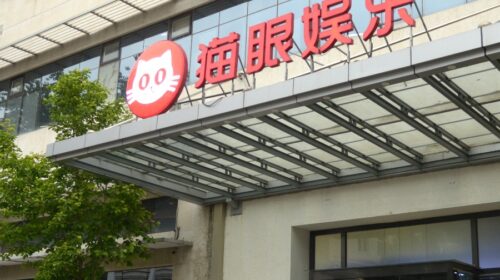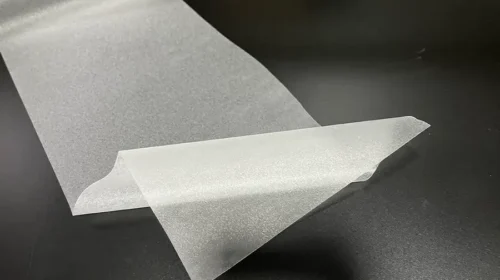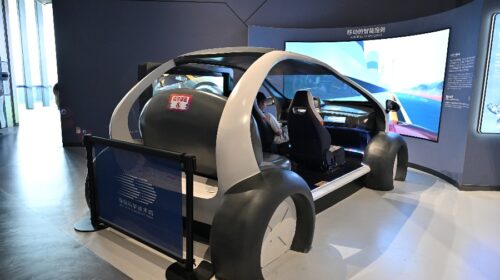CHINA BULLETIN: Exports Post Surprising Uptick


In this week’s issue an upside export surprise, car sales sputter and Beijing’s office gets emptier. On a scale of 1 to 100, we give the week a 45 for offshore-listed China stocks.
Doug Young, Editor in Chief
You can sign up to get China Bulletin weekly in your inbox.
MACRO
Exports Post Surprising Uptick
China’s slumping exports broke a five-month losing streak with an unexpected 14.8% surge in March, confounding economists who had expected the figure to tick down by 7%. It’s quite rare to see such a huge discrepancy between forecasts and the final number, and reports are saying the upside surprise could be a one-off event fueled by shipments for a backlog of orders.
Exports were also in separate headlines as new Premier Li Qiang called for greater policy support to stabilize and improve the country’s exports structure. What he actually meant is anyone’s guess from this kind of vague clarion. More importantly, Li is laying out his agenda following his recent elevation to the premiership, so this appears to show that export support will be part of that.
Justice Served to Corrupt Supreme Court Official
Next we’ll deviate just slightly from our usual stable of macro issues to a report that Meng Xiang, a former official from the enforcement office of the Supreme People’s Court, was sentenced to 12 years for accepting $3 million in bribes. The abuses occurred over a 17-year period from 2003 to 2020, and saw Meng accept bribes to help others gain contracts and promotions.
More than a decade after chief corruption buster Xi Jinping took office, these kinds of cases are still quite regular in the China news mill, showing just how endemic the problem is. The court system is particularly vulnerable, since it’s quite easy for judges and others to take money from whoever will pay in exchange for favorable verdicts in legal disputes.
China Stocks Eke Out Gains
A holiday hangover sucked much of the life out of stock markets last week, as Hong Kong took a day off on Easter Monday and the U.S. got back to work after its own three-day holiday for Good Friday the previous week. The Hang Seng China Enterprises and Hang Seng indexes eked out 0.2% and 0.5% gains during the week, respectively, while the iShares MSCI China ETF actually fell 1.8%.
The holiday breather came as Hong Kong and New York investors are still digesting a deluge of data from listed Chinese companies that came to the usual sudden halt at the end of March. With so much data now squarely in the rear-view mirror and the Easter Holiday, it’s no wonder that trading enthusiasm was relatively muted for the week.

Industry
Car Sales Run Out of Gas
China’s auto market rounded out the first quarter with an uninspired 13.4% drop in passenger car sales in March, resulting in a 4.5% drop for the entire quarter. What’s even more worrisome, the accelerating declines in March came as car dealers engaged in an increasingly heated price war that didn’t seem to have much effect, at least not based on the declining sales.
China’s car market was once the country’s pride and joy, reflecting the huge rise in consumption power for millions of Chinese who would have used clunky bicycles to get around just 20 years ago. But appetite for cars has cooled considerably with the slowing of China’s economy, leading many to think twice about buying such big-ticket items that are also quite expensive to maintain.
Beijing’s Emptying Office
When we write about real estate, it’s usually to talk about China’s ailing residential property market. But last week one headline spotlighted similar, though less severe, pains being felt in the country’s office market. Specifically, data showed that new demand for Beijing’s best office space plunged 21% in the first quarter from the fourth.
Of course, there’s a seasonal element to this, since the first quarter is typically slow due to the Lunar New Year holiday. But the same data set also showed that the vacancy rate for Grade-A office space in Beijing reached a record high of 16.8% in the first quarter, up 0.5 percentage points from the previous quarter.
Stamping Out Corruption in Sports
While we’ve already noted a former Supreme Court official took heat for bribery last week, the entire sports industry was also subject to a new round of disciplinary action by the Communist Party. Specifically, the General Administration of Sport was one of several government agencies singled out for a new round of inspections as Beijing steps up its latest anti-corruption campaign.
Ten current or former sports officials caught up in the latest clampdown were named at a meeting held by the General Administration of Sport last week to showcase the cleanup. Sports is notoriously corrupt in China, which shouldn’t come as a huge surprise given the gambling that often surrounds the industry and the broader corruption problem in China.

Company
Alibaba and Tencent Get Jilted
There’s nothing like a lover scorned, and last week saw two such jilted giants in China’s tech realm. E-commerce titan Alibaba led the charge, after a report emerged that longtime investor Softbank was moving to dump its remaining stake in the company. Not to be outdone, Tencent also felt a chill as longtime stakeholder Prosus indicated it would sell down more of its stake.
Both Softbank and Prosus have actually been quite loyal to Alibaba and Tencent over the years, and were among the two tech giants’ earliest backers when they were just starting out. Both have sold down some of their stakes already, but the latest selling probably reflects huge gains from those investments being used to offset recent losses in the current weak market.
Sunac’s Stock Collapses
Much has been written about Evergrande, which has become a poster child for all that’s wrong with China’s ailing property market. But another former real estate major took center stage last week as Sunac’s shares resumed trading after a one-year suspension for listing violations. Not surprisingly, the stock lost more than half of its value the day trading resumed.
Perhaps we should commend Sunac for resuming trading at all, as it might’ve been easier for the company to simply let nature take its course and be forcibly delisted for failing to file its financial reports on time. The company returned to compliance by filing its 2022 annual report, which showed it lost 27.7 billion yuan last year, or about $4 billion.
Chinese Luxury Buying Snaps Back
New data from global luxury giant LVMH showed that so-called “revenge spending” was taking place in China during the first quarter. The global bellwether reported its first-quarter sales rose 17%, more than double analysts’ expectations, which included 14% growth for its Asia region, excluding Japan.
The company singled out China, saying it expects the former luxury superstar to drive its growth this year. It seems almost inevitable that China will bounce back to some extent following a miserable year in that market last year for the luxury brands. But in the current conservative spending climate, we wouldn’t expect the rebound to be huge.
AND FROM THE PAGES OF BAMBOO WORKS
| Pinduoduo Follows TikTok Into the U.S. Hotseat Last week we spotlighted PDD, formerly known as Pinduoduo, whose U.S.-based Temu discount e-commerce app has gotten caught up in a TikTok-like scandal for containing malware. This story is quite Chinese and not as sinister as one might think. In short, the app was basically designed to gather more user data than it should be, and also to exploit the Android OS. Honestly speaking, this kind of behavior is all too common among internet companies in China, so it shouldn’t come as a huge shock that PDD engaged in what it knows best outside its own borders. But the company and its Chinese peers, including TikTok, are quickly learning that the kinds of shenanigans that happen in China are often verboten outside its borders. |
| Xtep Takes a Breather After Marathon Pandemic Sprint We also turned our spotlight on Xtep, a relatively large homegrown Chinese athletic shoe maker, whose latest first-quarter financial update showed its growth was slowing with the end of the pandemic. Xtep was one of a relatively small group of companies that actually prospered during the pandemic as people became more health conscious. So, it’s not a huge surprise that with the pandemic now winding down, people may go back to spending more money on some of their less healthy habits. Consumer boycotts that also hurt foreign sports brands and benefited local players like Xtep a couple of years ago also seem to be fading, which is probably another factor behind the slowdown at Xtep. |






